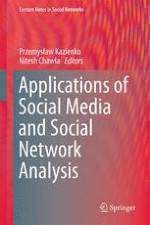2015 | OriginalPaper | Chapter
A New Linguistic Approach to Assess the Opinion of Users in Social Network Environments
Authors : Luigi Lancieri, Eric Leprêtre
Published in: Applications of Social Media and Social Network Analysis
Publisher: Springer International Publishing
Activate our intelligent search to find suitable subject content or patents.
Select sections of text to find matching patents with Artificial Intelligence. powered by
Select sections of text to find additional relevant content using AI-assisted search. powered by
